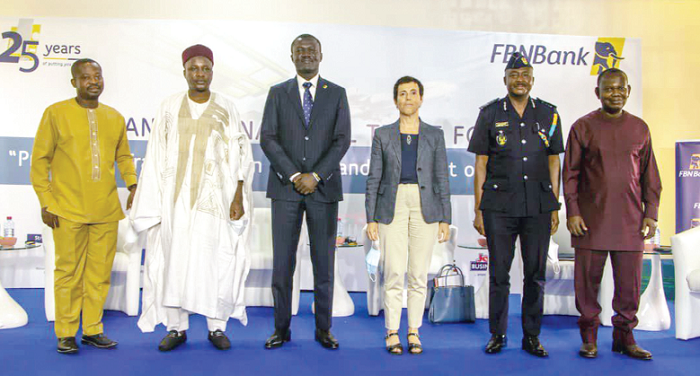The Ministry of Trade and Industry is collaborating with some institutions to review regulations governing institutions in Ghana’s export sector.
The review will enable the export finance institutions to design special financial solutions for strategic export products and special initiatives such as the One-district, One-factory (1D1F).
Current regulations governing the country’s main export finance institution, the Ghana EXIM Bank, do not allow for the crafting of special products to achieve specific ends.
National Trade Forum
The Minister of Trade and Industry, Mr Alan Kyerematen, disclosed this at FBNBank Ghana’s National Trade Forum in Accra yesterday.
The forum was on the theme: ‘Promoting trade between Ghana and the rest of the world’.
The minister said the move formed part of the government’s effort to support access to finance by players in the export sector.
“There is a general lack of access to financing for export and high cost of capital in Ghana. Currently, the Monetary Policy Committee (MPC) rate, which is an important benchmark for pricing lending rates in Ghana, stands at 13.5 per cent.
“This compares with 3.5 per cent in South Africa, four per cent in Cote d’Ivoire, seven per cent in Kenya and 11.8 per cent in Nigeria,” he pointed out.
He said financing for export had become an important issue that required immediate collective attention if the Ghanaian private exporter must harness the benefits in the sector.
“The government has already introduced a number of interventions aimed at supporting the business community with access to finance, as well as reduce the cost of credit, and this will come to add up,” Mr Kyerematen, whose keynote address was read on his behalf, stated.
The minister noted that the forum could not have selected a more appropriate theme than putting the spotlight on promoting international trade and socio-economic development.
He said the history of the economic transformation of the leading countries in Europe, North America and Asia confirmed that no country had experienced significant economic development without becoming a major trading nation.
“Both developed and developing countries have benefitted enormously from international trade,” he said.
Role of banks
The Managing Director of FBNBank Ghana, Mr Victor Yaw Asante, for his part, said promoting Ghana’s trade with the rest of the world was a responsibility which required team effort.
He said all stakeholders must contribute to the agenda, with banks being no exception.
He said banks generally had a fiduciary responsibility to contribute to the development of the markets in which they did business.
“It is a business imperative. In addition to providing credit, banks should ensure that the credit is used for the agreed purpose by competent persons in an efficient way.
“Acknowledging the rather obvious fact that our activities, whether positive or negative, have a significant impact on the economy, the banks must support trade and the economy in several ways,” Mr Asante stated.
The managing director also noted that the importance of trade to human survival could not be overemphasised.
“For centuries, trade has taken place as a means of bringing about social and economic progress. Today, the people of Ghana continue to see the need to trade with the world beyond our borders and acknowledge the fact that it is a key way to deliver economic prosperity.
“According to the World Bank, in 2019, trade contributed about 71 per cent of Ghana’s Gross Domestic Product (GDP). This alone tells us the significant value that trade delivers to our economy,” M Asante pointed out.
He said it was for that reason that the FBNBank and its partners had come together to find ways to promote trade between Ghana and the rest of the world.
Enablers of progress
As a bank, he said, FBNBank was not merely a provider of funds and credit but also enabler and driver of progress in many ways.
“Our conviction is that by bringing to the fore the key issues through economic activity which drive our progress as a country, we will find ways through which we can address the challenges, and by so doing set Ghana on an even better trajectory for growth.
“In our 25th year in Ghana, we at FBNBank believe we have attained the position of a catalyst for Ghana’s development and it is a responsibility we are committed to undertake in several ways,” Mr Asante said.
He added that the bank’s focus on SMEs and the support SMEs had received from it, particularly within the past two decades, especially during the early days of the COVID-19 pandemic, “is ample testimony of what we are dedicated to”.
